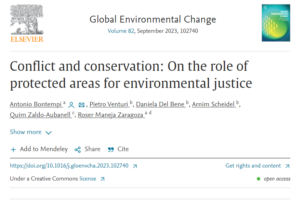
Research based on the Environmental Justice Atlas – www.ejatlas.org
Available at Global Environmental Change journal – ScienceDirect
Authors: Antonio Bontempi, Pietro Venturi, Daniela Del Bene, Arnim Scheidel, Quim Zaldo-Aubanell, Roser Maneja Zaragoza
Abstract
When are protected areas drivers of environmental injustices and conflict, and under which circumstances may they support customary users in protecting their lands and livelihoods against extractivist development? We address these questions by analyzing the diverse roles that protected areas play in the context of environmental conflicts. We build a global database of 474 environmental conflicts in protected areas by overlapping data from the World Database of Protected Areas and the Global Atlas of Environmental Justice. Through descriptive statistics and content analysis, we characterize the intersections between the two databases and discuss those cases where protected areas play an important role in the origin, dynamics, or outcomes of the conflicts. Our findings show that growth-oriented extractivism and development are major drivers of conflicts in protected areas, where these latter can both jeopardize and support environmental justice. While several cases describe protected areas as drivers of injustices and conflicts, they can also become tools that support peoples’ struggles against controversial extractivism and development projects. The diversity of possible interactions between conflict configurations, movement claims, and forms of conservation thus require a nuanced understanding of the complex implications of protected areas for environmental justice.
Highlights
- We analyse 474 environmental conflicts located in protected areas.
- Extractivism is a major driver of environmental conflicts in protected areas.
- The roles of protected areas in environmental conflicts are multifaceted.
- Protected areas can be major drivers of environmental injustices and conflicts.
- However, protected areas may also support struggles against growth-based extractivism.

The project ENVJUSTICE has received funding from the European Research Council (ERC) under the European Union’s Horizon 2020 research and innovation programme (grant agreement No. 695446)